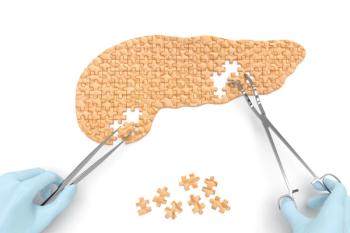
Corticosteroid Therapy Does Not Impact Overall, Progression Free Survival in ICI Therapy
Patients who received corticosteroid therapy to treat immune checkpoint inhibitor-related adverse events did not have a shorter overall or progression free survival compared with corticosteroid therapy-free patients, according to a research letter published in JAMA Oncology.
Current standard of care for individuals living with metastatic clear cell renal cell carcinoma (mccRCC) is immune checkpoint inhibitor (ICI) therapy with nivolumab. Corticosteroids are used to treat ICI-related adverse events stemming from ICI therapy, but there are concerns around the “detrimental effect” of immunosuppression on the efficacy of ICI therapies and patient survival.
Using data from the NIVOREN clinical trial (NCT03013335), researchers from France conducted an ancillary study evaluating the association of corticosteroids with survival outcomes over the course of nivolumab treatment in patients with mccRCC. NIVOREN is a nonrandomized, multicenter, single-arm, prospective, phase 2 safety study of nivolumab therapy in mccRCC after progression on antiangiogenic treatment. Between February 2016 and July 2017, patients received nivolumab every 2 weeks until either death, disease progression, or unacceptable toxicity. Data on corticosteroid use was collected prospectively to identify patients who were or were not exposed to corticosteroids during treatment, and those who received corticosteroids for progression were excluded from the study.
A total of 665 patients were available for evaluation (mean age, 63.4±10.4 years; 77.3% men; median follow up, 23.9 months). Within this group, 17% received corticosteroids during the course of their nivolumab treatment. Starting dose of this medication was 60 mg prednisone equivalents (interquartile range [IQR], 40 mg-80 mg); median time between nivolumab therapy initiation and corticosteroid use was 21.6 weeks (IQR, 7.6-40 weeks). A total of 73.5% of patients received corticosteroids for ICI-related adverse events, 41.6% of which were grade ≥3 events. Other reasons for corticosteroid initiation included radiotherapy adverse events, infections, and chronic obstructive pulmonary disease.
At 12 months, overall survival rates were 85.6% and 73.5% in patients exposed and not exposed to corticosteroids, respectively; progression free survival rates were 61.1% and 41.6%, respectively (hazard ratios, 0.57 and 0.63).
“Patients exposed to corticosteroids did not have a shorter [overall survival] or [progression free survival] than patients who were not, which is consistent with previous work,” the researchers noted, adding that study limitations included “possible persistent immortal time bias and the variety of indications for corticosteroid use.”
“Patients required corticosteroids mainly for [ICI-related adverse events], which may have selected the [adverse events] associated with a stronger immune response and, thus, a greater antitumoral activity, as suspected in previous studies,” they concluded. “This difference may also be due to a persistant significant immortal time bias. Both hypotheses are not inconsistent with one another and need further investigation.”
Reference
1. Lefort F, Dalban C, Gross-Goupil M, et al. Association of corticosteroids with survival outcomes in patients with metastatic renal cell carcinoma treated with nivolumab. JAMA Oncol. Published online July 13, 2023. doi:10.1001/jamaoncol.2023.2296
Newsletter
Pharmacy practice is always changing. Stay ahead of the curve with the Drug Topics newsletter and get the latest drug information, industry trends, and patient care tips.























